- AI Writing Services
- AI Detectors
- Coding Homework Help
- Citation Generators
- Editing Websites
- Essay Writing Websites
- Language Learning Websites
- Math Solvers
- Paraphrasers
- Plagiarism Checkers
- Reference Finders
- Spell Checkers
- Summarizers
- Tutoring Websites
- Essay Checkers
- Essay Topic Finders
- Top Lists and Recommendations
- Writing an Essay
- Writing a Review
- Writing a Research Paper
- AI Writing Guides
- AI Detection Guides
- Citation Guides
- Coding Guides
- Grammar Guides
- Humanities Guides
- Language Learning Guides
- Paraphrasing Guides
- Plagiarism Guides
- Summary Writing Guides
- STEM Guides
- Academic Text Samples
- Application Essay Samples
- Business Writing Samples
- Creative Writing Samples
- Letter Writing Samples
- Writing Tips and Rules
- Student Life
- Higher Education News
- EdTech News
- Job Market for Students
- Academic Writing Tips
- Language Learning Tips
- Coding Tips and Trends
- AI Detector
- AI Essay Checker
- AI Essay Writer
- Citation Generator
- Grammar Checker
- Literature Review Generator
- Paraphraser
- Plagiarism Checker
- Reference Finder

Most Popular
12 days ago
A*Helpful Fact: Only 12% of Americans Know How to Be Metabolically Healthy
13 days ago
A*Helpful Fact: Some Birds Like to Snack On Hot Pepper
A*helpful fact: why are beavers teeth orange it’s an iron logic of nature, a*helpful fact: why does stretching feel good, a*helpful fact: when were pop its invented after a dream about breasts, from karl marx to toga shortages: reddit’s funniest essay mistakes.

Pursuing higher education is a long and challenging adventure demanding hard work, analytical thinking, and well-crafted writing. Yet, in their willingness to express themselves, students sometimes come up with odd, funny, and even ridiculous conclusions. Funny enough, they earn them high grades at times. Hard work pays off, as we know. And so does unplanned creativity, apparently.
Key Takeaways:
- Student essays often contain humorous mistakes because of stress, time pressure, and misunderstandings
- Grammar errors, factual inaccuracies, tautologies, and redundancies are frequent errors in student writing
- Some mistakes don’t pose much of a threat, while others will significantly lower your score.
It’s hardly a shock that essays with bizarre sentences, weird ideas, or outlandish theories often get the nod from the teachers. This likely comes from professors being well-acquainted with their students’ communication (and consequently, writing) styles. When they see something in an essay that deviates from norms or common sense, they tend to chalk it up to a simple accident. The student, perhaps overwhelmed by the whirlwind of ideas and arguments, might have simply lost their narrative thread without realizing it. Or, which is also possible, some professors genuinely embrace fresh, daring, or even revolutionary perspectives, and actively encourage such originality, even if these ideas are rather grotesque, so to speak.
This takes us to an interesting account provided on Reddit by a user who tells about their experience with the AP World History Exam. The author revealed, “I took the AP World test, and during the LEQ, I said that revolutionaries such as Karl Marx postulated new economic ideas. I did not cook using that statement. Seriously, the exam was completely free.” The post received a lot of attention, prompting hilarious and empathic reactions from other Redditors about what they believed were stupid things written in academic papers.
Stupidest thing you’ve written on an essay? by u/ElectroBOOMFan1 in APStudents
Common Hiccups in Student Essays
Ah, the curious subjectivity of mistakes! For some, what passes as the norm might be a terrible mistake in the eyes of another. Remember the beloved late 80s sitcom featuring the extraterrestrial Alf, who lived with a typical American family? In one of the episodes, Alf accidentally switches on the television that Willy, the family patriarch, is repairing. Electrified by the incident, Willy proclaims it a tragedy, whereas Alf, ever the interstellar optimist, downplayed the event to a less dramatic term – “a mistake.” Such is the disparity in perspectives!
Sadly, most teachers belong to the old school of traditional education and aren’t quite the bastions of open-mindedness. They have a habit of cataloging mistakes, assessing their severity, and eagerly deducting points. We, mortals of the student body, are left to put up with it and do our best to avoid making errors. But, let’s face it—who doesn’t make them? We’ve all faltered in our academic attempts to a certain degree. Some of the most frequent missteps include the following.
Grammar Mistakes
Grammar mistakes are our constant companions, stubbornly persisting despite our best efforts to dodge them. These slip-ups range from minor, like a missing letter in a word that doesn’t alter the intended message, to major blunders that completely flip the meaning of a sentence on its head.
Spelling Errors : Spelling errors are one of the most basic and prevalent mistakes in student essays. These mistakes can range from simple typos to more consequential misunderstandings of word spelling. Spell-check tools can catch many of these errors, but reliance on technology can sometimes lead to overlooked mistakes, especially with homophones (words that sound the same but have different meanings, like “their” and “there” ).
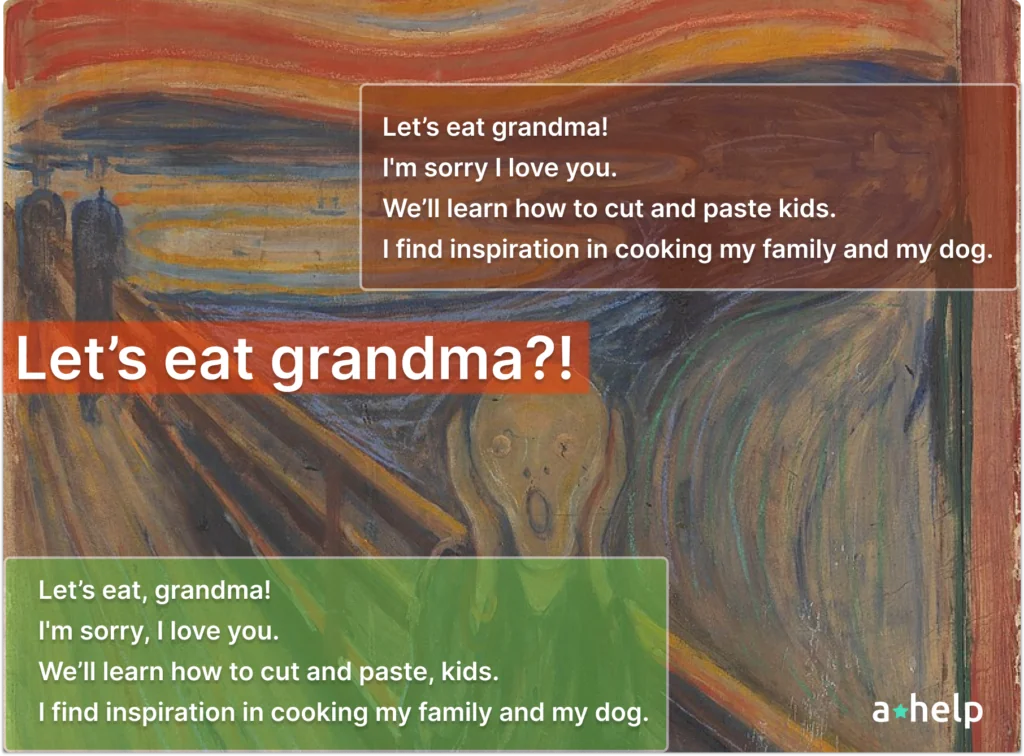
Punctuation Problems : Punctuation errors can drastically change the meaning of a sentence. Common issues include misplacing commas, incorrect apostrophes, and wrong use of periods, semicolons, and colons. For example, “ Let’s eat, grandma ” is quite different from “ Let’s eat grandma .” Proper punctuation secures clarity and precision in writing.
Sentence Structure : Issues with sentence structure can include run-on sentences, sentence fragments, and awkward phrasing. Run-on sentences occur when two or more independent clauses are improperly joined, while sentence fragments are incomplete thoughts presented as sentences. Awkward phrasing can make sentences confusing or difficult to read. Clear and concise sentence structure is crucial for effective communication.
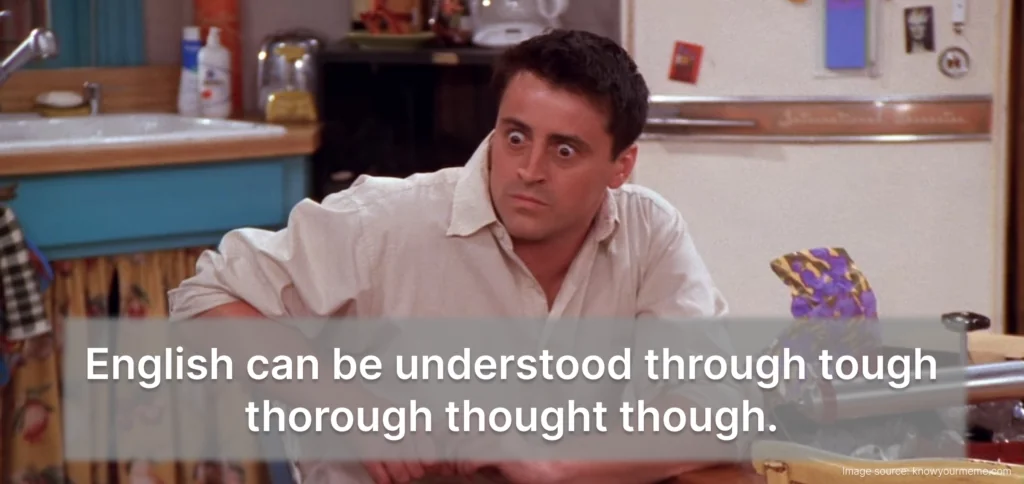
Context Mistakes
These inaccuracies aren’t always as obvious as a misplaced comma. If your mistake is contextual, it could lead to being misunderstood at best, or at worst, being regarded as unhinged. So tread carefully and steer clear of the following mistakes:
Fact Confusion: Confusing historical facts or events is a common mistake, especially in subjects like history or social studies. For instance, a student might write that “ Abraham Lincoln was the first president of the United States, ” mixing up a key historical fact. Such errors can arise from a lack of thorough understanding or simply mixing up facts under pressure.
Tautology: Tautology involves repeating the same idea using different words, which can make writing redundant and tiresome. For instance, saying “The beginning of the start was at dawn” is repetitive. Students should strive to convey their points without unnecessary repetition.
Redundancies: Redundancies involve including unnecessary words or phrases that do not add value to the sentence. This can clutter writing and make it less effective. For example, writing, “In my personal opinion, I think that…” is redundant, as “I think” already indicates it is a personal opinion.
Lack of Fact Knowledge: Sometimes students write confidently about topics they do not fully understand, leading to bizarre or incorrect claims. For example, “The invention of the airplane in the 18th century revolutionized travel” shows a misunderstanding of historical timelines.
Why do we make mistakes? Several factors contribute to all these types of errors in student essays. Stress and time pressure from high-stakes exams and tight deadlines often lead to hasty writing and this results in overlooked mistakes. A lack of understanding of grammar rules or the subject matter can also cause errors, as students struggle with complex language rules or misunderstand the topic. Overreliance on technology, such as spell-check and grammar-check tools, can further deepen the problem, as these tools are not foolproof and may miss context-specific errors or suggest incorrect changes. Additionally, inadequate proofreading , whether due to time constraints or negligence, results in missed mistakes that could have been corrected. Finally, the pressure to meet specific word counts can lead students to add unnecessary words or phrases, resulting in redundancies and tautologies. Therefore, quality should always take precedence over quantity to guarantee clear and accurate writing.
Laughter and Empathy on Reddit
The Reddit post about the AP World History exam generated a lively discussion, with many users chiming in to share their own funny and often embarrassing essay mistakes. The original post captured a common experience among students who have faced the pressure of high-stakes exams and the resulting brain freezes.
There’s a general understanding among students that exam graders often prioritize the essence of the argument over the precision of the language behind it, recognizing the constraints students are under during exams. One user reassured the author by saying, “You made your point very clearly, I don’t see a problem here. The wording just sounds off. I mean, it’s not Shakespeare. But they grade these as rough drafts so it’s more about the content than the actual writing, if that makes sense.”
Another user added their own funny recollection: “I once wrote that Alexander the Great conquered Europe in the 18th century. My teacher’s comment was, ‘Impressive, considering he lived in the 4th century BC.'”
This kind of factual error is, of course, embarrassing, but it is also relatable and could have been caused by the intense pressure students face. After all, the difference in 22 centuries isn’t that big of a deal (historically speaking).
The thread quickly filled with similar stories, each more amusing than the last. One user mentioned,
This example explains how teachers often appreciate the creativity and effort students put into their answers, even when the facts are off.
Another Redditor commented, “I advocated for teleportation as a solution to traffic congestion in a serious economics essay. I got an A for thinking outside the box, but my professor suggested I stick to more feasible solutions next time.” This illustrates how outlandish ideas, even though not always practical, can sometimes be rewarded for their originality and the unique perspective they bring to the discussion.
A particularly memorable comment read, “I wrote about how the Roman Empire fell because they ran out of togas. My teacher’s note was, ‘Interesting theory, but let’s explore some historical evidence next time.'” This kind of playful feedback from teachers shows that they often recognize the effort and creativity behind these mistakes, and use them as teaching moments rather than harshly penalizing students.

The overall tone of the Reddit discussion was friendly and empathetic. Many users expressed relief at finding out they weren’t alone in making silly mistakes under pressure. Comments like, “Glad to know I’m not the only one who has written something ridiculous during an exam” were common throughout the thread. This shared experience of making and laughing at mistakes created a sense of community among the participants. Errors are a natural part of the learning process and even the most bizarre mistakes can lead to growth and improvement. The supportive environment encouraged students to view their mistakes with humor and to learn from them rather than feeling discouraged.
Follow us on Reddit for more insights and updates.
Comments (0)
Welcome to A*Help comments!
We’re all about debate and discussion at A*Help.
We value the diverse opinions of users, so you may find points of view that you don’t agree with. And that’s cool. However, there are certain things we’re not OK with: attempts to manipulate our data in any way, for example, or the posting of discriminative, offensive, hateful, or disparaging material.
Cancel reply
Your email address will not be published. Required fields are marked *
Save my name, email, and website in this browser for the next time I comment.
More from Academic Writing Tips

Spooktacular Halloween Writing Prompts That Will Blow Your Gourd Clean Off

Essay Topics on Black Friday History for Students

Personal Statement for Social Work: Here’s How to Convince the Admissions Committee
Remember Me
Is English your native language ? Yes No
What is your profession ? Student Teacher Writer Other
Forgotten Password?
Username or Email
Digital Synopsis
Design, Advertising & Creative Inspiration
10 Hilarious Examples Of How Punctuation Makes A Big Difference
The absence or presence of a comma can change the entire meaning of a sentence. For example, there’s a cannibalistic difference between “Let’s eat grandma” and “Let’s eat, grandma.” The same holds true for apostrophes, hyphens, colons, and other punctuation marks. Subtle details like these are crucial, just as the guidance of an easy essay writer can refine your essays to perfection.
Curtis Newbold from The Visual Communication Guy has come up with a hilarious infographic that illustrates the meanings of sentences with and without proper punctuation. Check it out below.

Share this post and voice your views in the comments below. You can purchase a high resolution version of this chart here .
Don't Miss:

Share Your Views
- 51 Creative Logos That Use Negative Space Brilliantly
- This Guy Photoshopped Himself Into His Childhood Pics To Hang Out With His Younger Self
- 11 Differences Between Designers And Clients
- Graphic Designer Fixes The 9 Worst Logos Ever
- Color Palettes From Famous Movies Show How Colors Set The Mood Of A Film
- Incredible New Feature In Photoshop Lets You Blend Images Perfectly With Just One Click
- How To Build A Strong Brand Identity For Consistent Content Marketing
- Adobe’s Groundbreaking New Feature Lets You Rotate A Flat 2D Vector Drawing In 3D
- Incredible New Feature In Photoshop Lets You Remove All Distractions With Just One Click
- Email Design and A/B Testing
25 Hilarious Proofreading and Editing Memes
| Candace Osmond
Candace Osmond
Candace Osmond studied Advanced Writing & Editing Essentials at MHC. She’s been an International and USA TODAY Bestselling Author for over a decade. And she’s worked as an Editor for several mid-sized publications. Candace has a keen eye for content editing and a high degree of expertise in Fiction.
If I had a dollar for every awkward grammar or punctuation I see, I’d be a millionaire. Seeing poorly written papers and signages makes me cringe and sympathetic toward a writer. But they also make me laugh, knowing I sometimes make the same mistakes.
Are grammatical mistakes your pet peeve? Here’s a list of 25 memes that will annoy and entertain the proofreader in you.
1. Regrets. Lots of Regrets
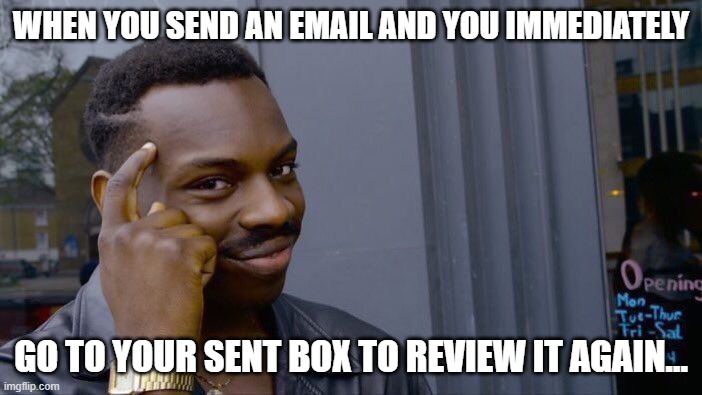
Everyone’s a little guilty of only double-checking that email after sending it. We proofread our assignments after submitting them just to check what the professor will be reading. It’s a horrible habit we all should unlearn if we want our writing to be successful.
Read your text several times for different types of errors. Scan it for spelling errors, then grammar mistakes, and punctuation issues. It would also help to fix that awkward sentence.
2. When You’ve Already Poured All Your Energy into writing.

Let’s get one thing straight. You need to care about proofreading! Otherwise, you shouldn’t have put much thought into writing.
Always allow time for editing and proofreading your text the same way you do with writing. Look at the structural changes you need to make and the minor, more technical errors.
3. Exactly What Proofreading is All About
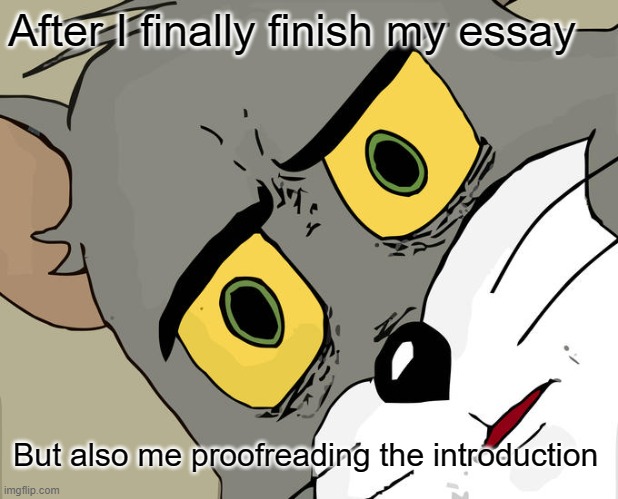
This meme perfectly explains the importance of reviewing your work. Sometimes, you think you’re making sense until you realize you have a poor choice of words.
Aside from reviewing your own work, it also helps to have someone read your paper. What you think is clear and readable might actually be a delirious clutter to your readers.
4. Take a Moment to Applaud Their Invisible Superpower
Unseen typos are a fact of life. We don’t always notice them on the second and third rounds of edits because we are not focused enough. Also, our minds are conditioned to read words correctly despite the wrong sequence or missing letters.
That’s why many books and articles undergo multiple stages of editing. There are developmental editors to check your arguments and copy editors for your grammar blunders.
5. Even the Kindergartener is Disappointed with the Proofreader
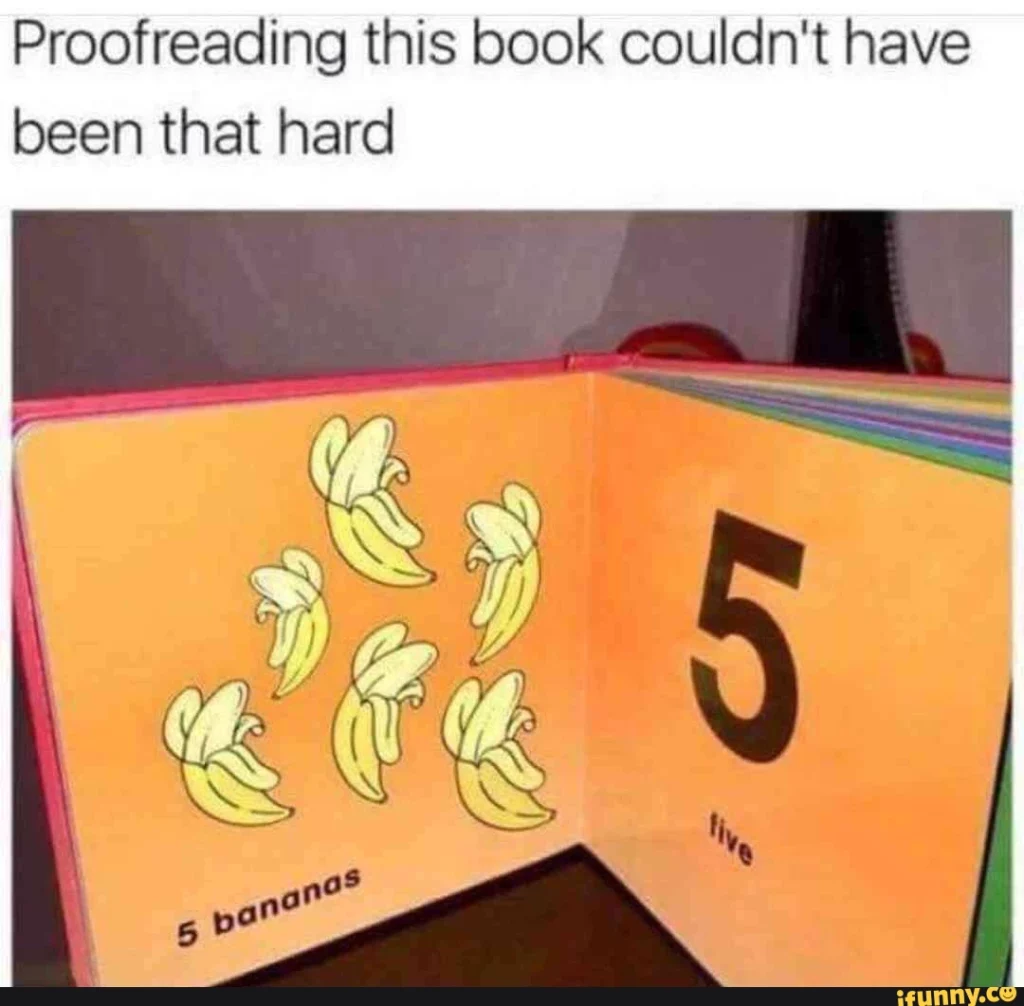
How could these two pages containing two numerical symbols and two words still have a typo? I could only imagine the kindergartener reader doing a facepalm.
The proofreader needs a refresher on the basics. Or did the publisher even hire one?
6. Anything to Get an A+ On the Next Paper
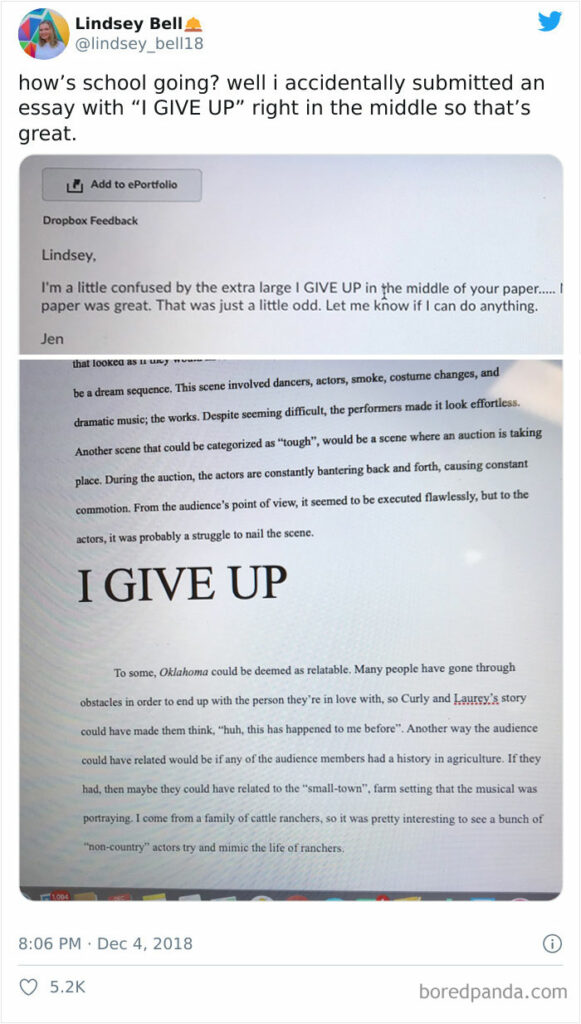
A polite greeting, perfect grammar, and two hours of proofreading a short email will make you think you’re exaggerating the email. And your professor will confirm this with their quick, effortless “ok” without a period.
But there’s nothing wrong with that. Behaving respectfully in emails is the norm if you want to be polite and have a good reputation.
7. When a Pile of School Work is Making You Lose Motivation
We’ve all done this with our school assignments. We type random, sarcastic text on items we don’t know the answer to or funny sentences we promise to delete. But the deadline is in five minutes, and there’s no more time to proofread.
You’re lucky if your professor is kind enough to take a joke. Otherwise, he’ll see you in detention.
8. I Bet You Had to Read this Meme Again

Again, our minds are conditioned to read words without errors. We can perceive words despite their sequence, the lack of letters, and the additional ones. In fact, there’s more than one error on the meme. Could you spot the two other mistakes?
9. If You Laugh, You Go to Hell
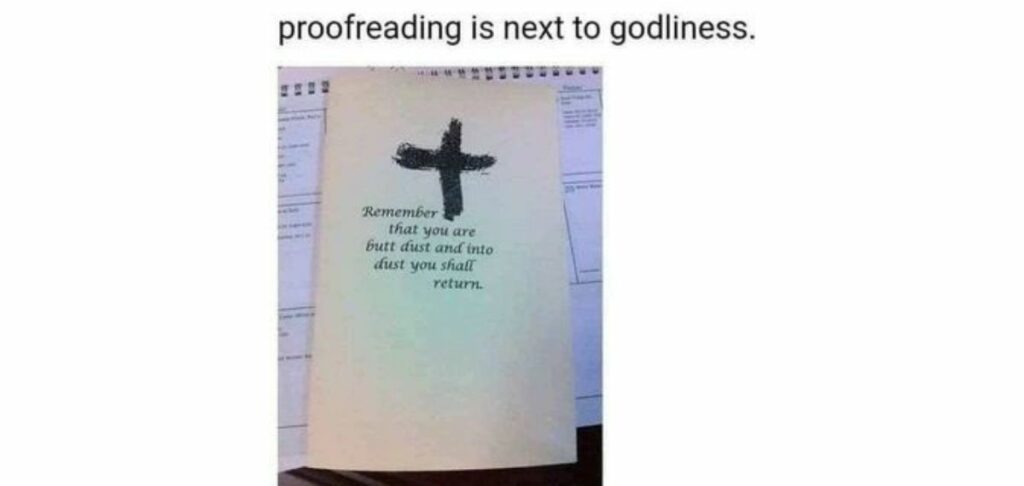
Proofreading is indeed next to godliness. Don’t make this embarrassing error, especially when writing pieces for critical settings like the church. God’s probably looking down on the writer with a disappointed look on their face.
I hope this meme inspires you never to skip proofreading because our brains’ auto-correction mode doesn’t always work.
10. Just As As What?
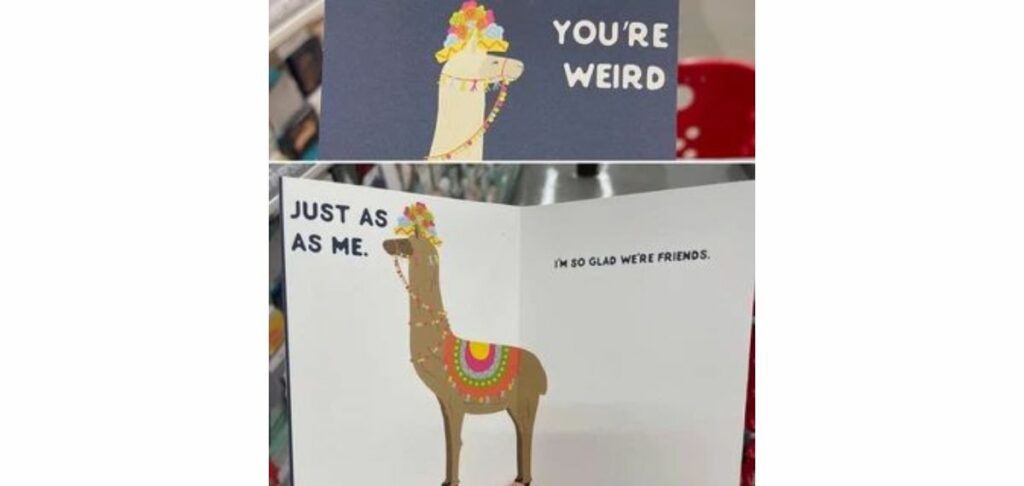
Another piece of writing with only a few words but a lot of mistakes. But at least it’s clear with the “I’m glad we’re friends” part!
Whether you make short greeting cards or long novels, you need a proofreader and editor for your tiny mistakes.
11. Separation of Church and State What?
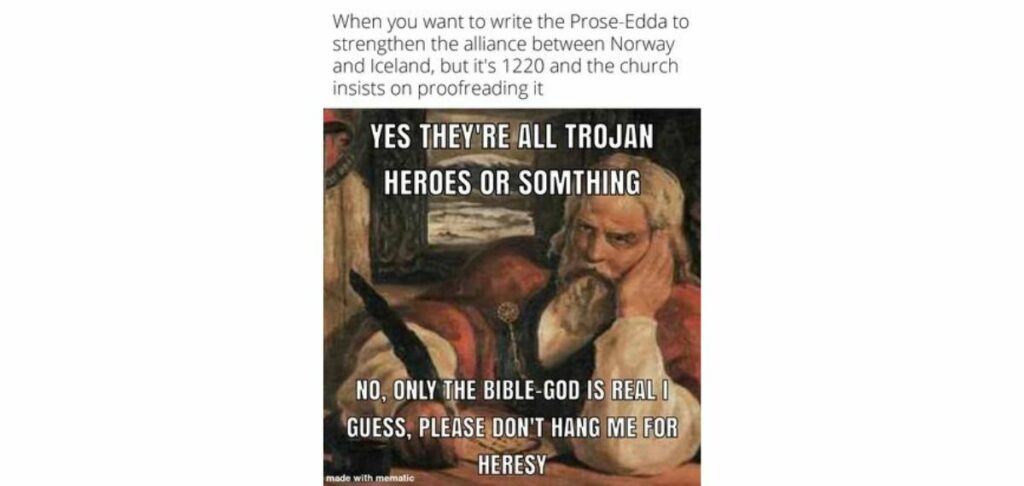
Did you know that the religious scenario of Iceland during the 13th century influenced the composition of Prose Edda? And Christianity hasn’t been very nice to the country’s rich literature, mythology, and culture.
The moral of the story here is to get to know your editor and proofreader. Don’t let them twist your words!
12. The True Definition of Relationship Goals

I’m not the romantic type of person. But I have to admit this meme made me jealous. All I could think of is the money I could save when I have a partner to edit my work. Plus points if he’s an English major with a collection of books.
13. A Rule I’m Willing to Break

Even law enforcers would rather ask you to break the law on this one. The local government unit should take this as a lesson to hire a translator and proofreader next time.
14. Is It a Grammar Thing or a Politics Thing?
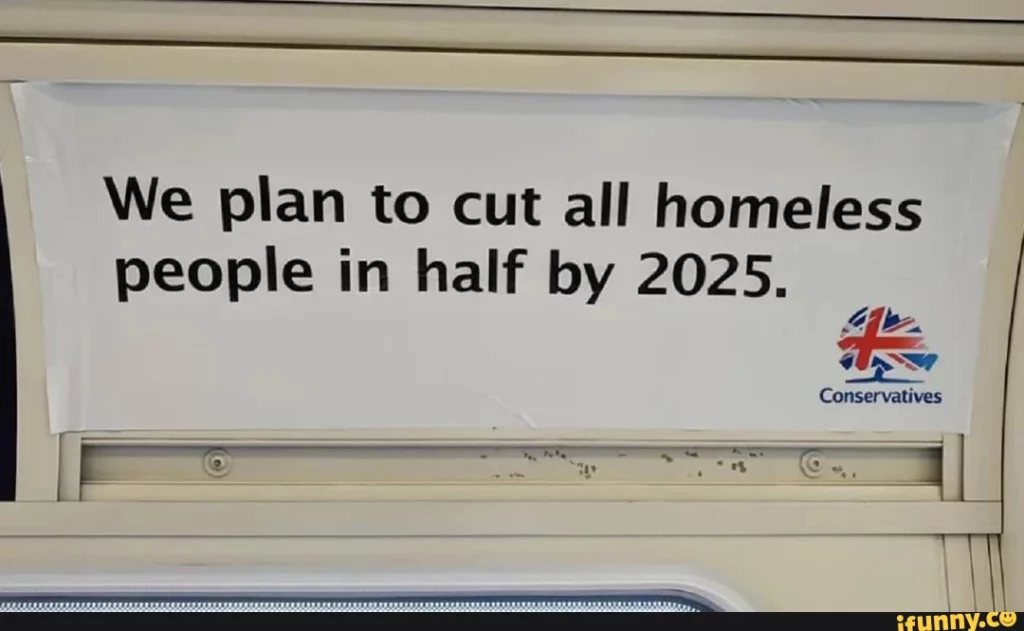
Another prime example of why you should hire a proofreader… or take a class on humanitarian studies.
Does anyone know if this slogan genuinely meant well? At first, it looks like a typo or grammatical mistake. Then, you notice the logo on the lower right.
15. Please Practice What You Preach
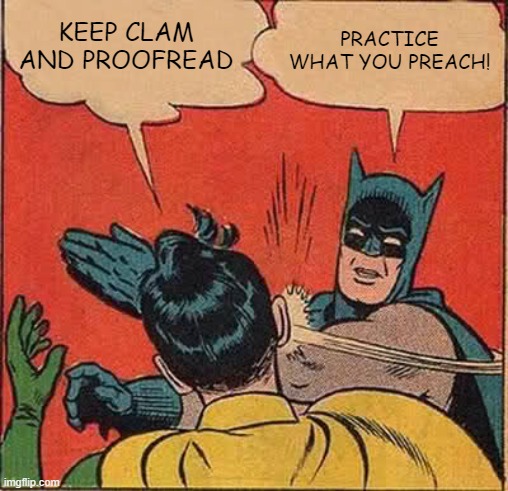
Insert Will Smith’s line from the Fresh Prince of Bel-Air: “He a little confused, but he got the spirit.” We get the message, but we don’t get the spelling.
16. Punctuation Saves Lives

Make sure to know proper comma placements. This punctuation mark indicates whether the noun after the verb is a direct address or a direct object.
17. Or Make Melonades
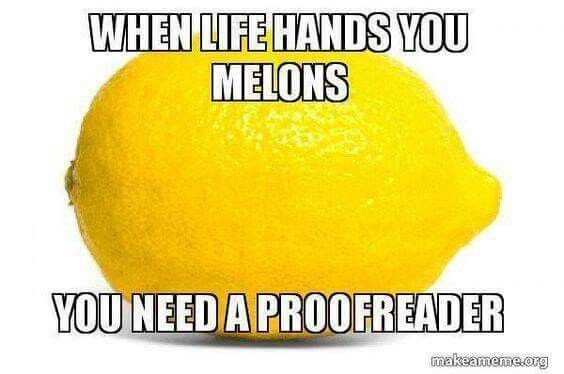
Proofreaders aren’t necessarily fruit experts. But they’re spelling and language experts who can save you from a few embarrassing moments. Get professional proofreading services to avoid all the confusion in your writing.
18. I Hope This Isn’t a Surgeon’s Washroom
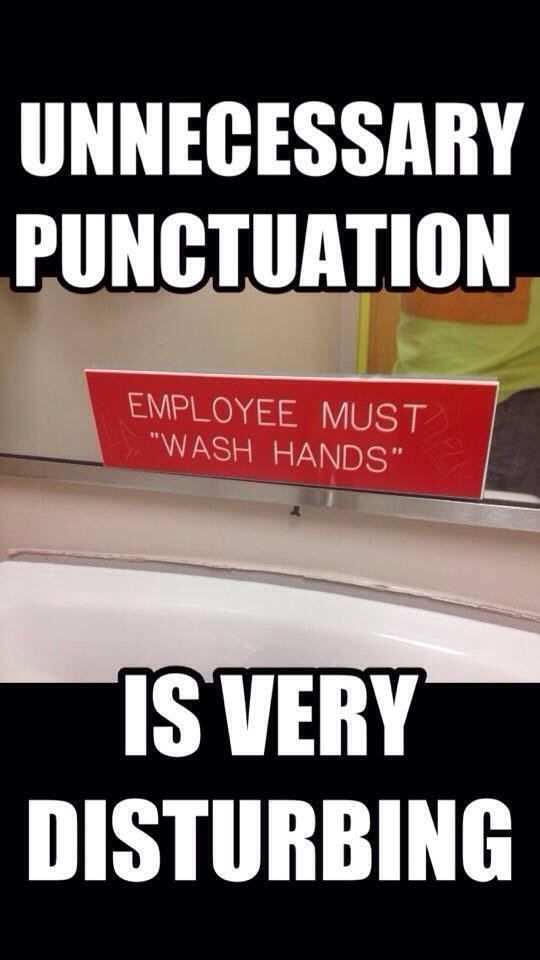
Who thought placing quotation marks in this sentence was a good idea? Fake hand-washing can transmit infections, viruses, and diseases, kids. So does improper punctuation placement. And someone, please change “employee” into its plural form!
19. This is What a Writer-Proofreader Relationship Looks Like
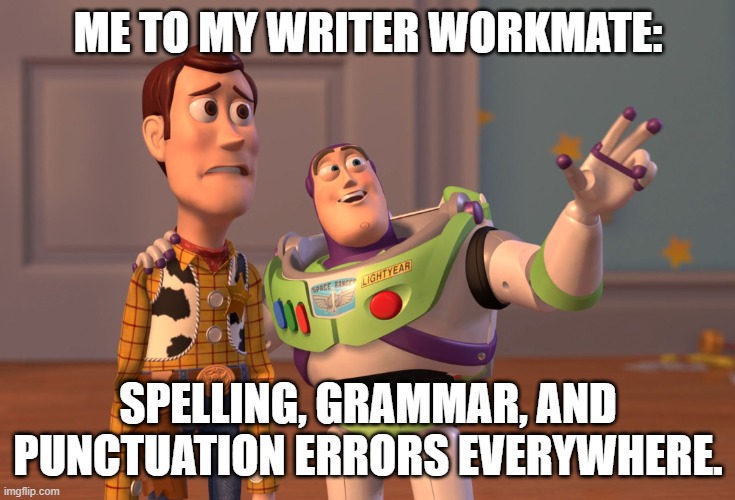
Everyone has an inner proofreader in themselves. It doesn’t cost a lot to correct someone’s punctuation error. It’s a small act of kindness that can help the person become a better writer over time.
20. Modern Cannibalism is Scary
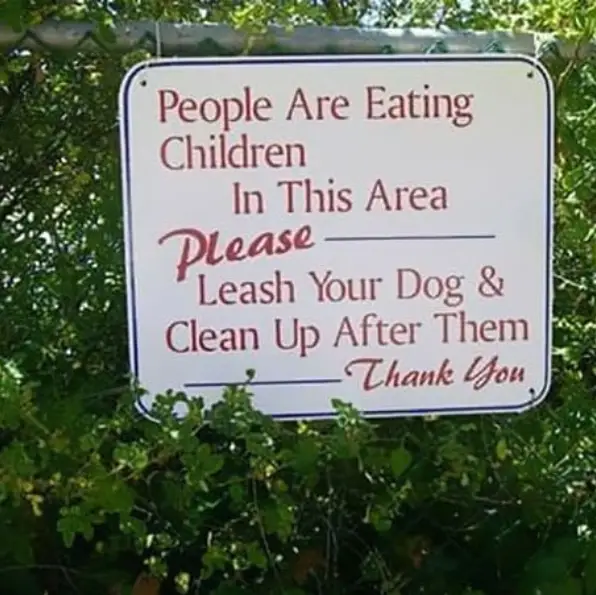
This slogan probably meant “People are eating in this area.” Aside from saving lives, proofreaders advocate for ending cannibalism.
A few tweaks in format, punctuation, and grammar could change this signage’s entire meaning. Unsurprisingly, more children would finally visit the area without fear.
21. This Meme Will Help Alot of Writers
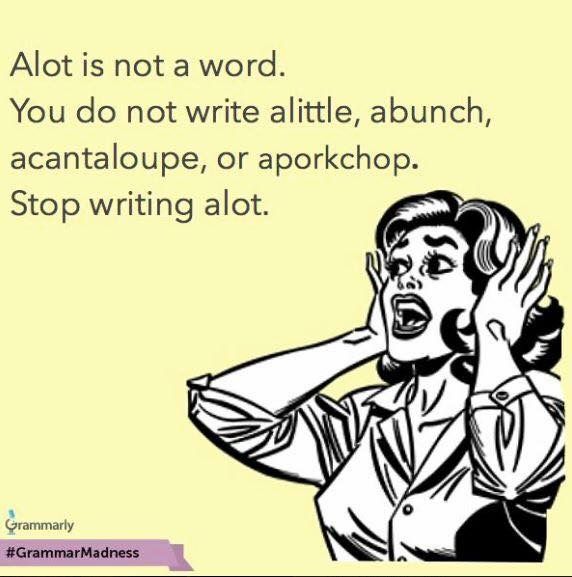
Some people need a daily reminder that “alot” doesn’t exist. Either you mean “a lot” or “allot.” However, if you want a quick way to piss off an editor or proofreader, “alot” sounds acceptable enough.
22. Apostrophes and Other Punctuation Problems
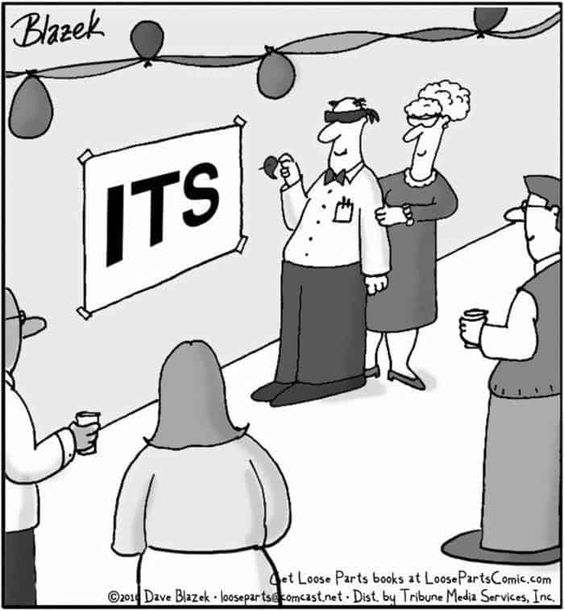
Two super confusing words in the English language are “its” and “it’s.” Remember to use “its” for the possessive form of the pronoun “it.” Only use the form “it’s” with an apostrophe as a contraction for “it is.”
23. Not Graduation Year, I Guess
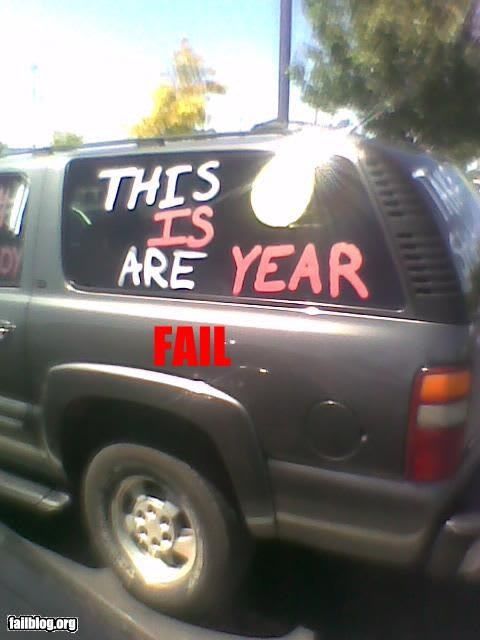
If you’re going to paint graffiti on your car, you might as well write and proofread it on paper first. Ask yourself, do I need a possessive pronoun or another linking verb? People will look at you in the driveway for all the wrong reasons.
24. Context Matters, Too
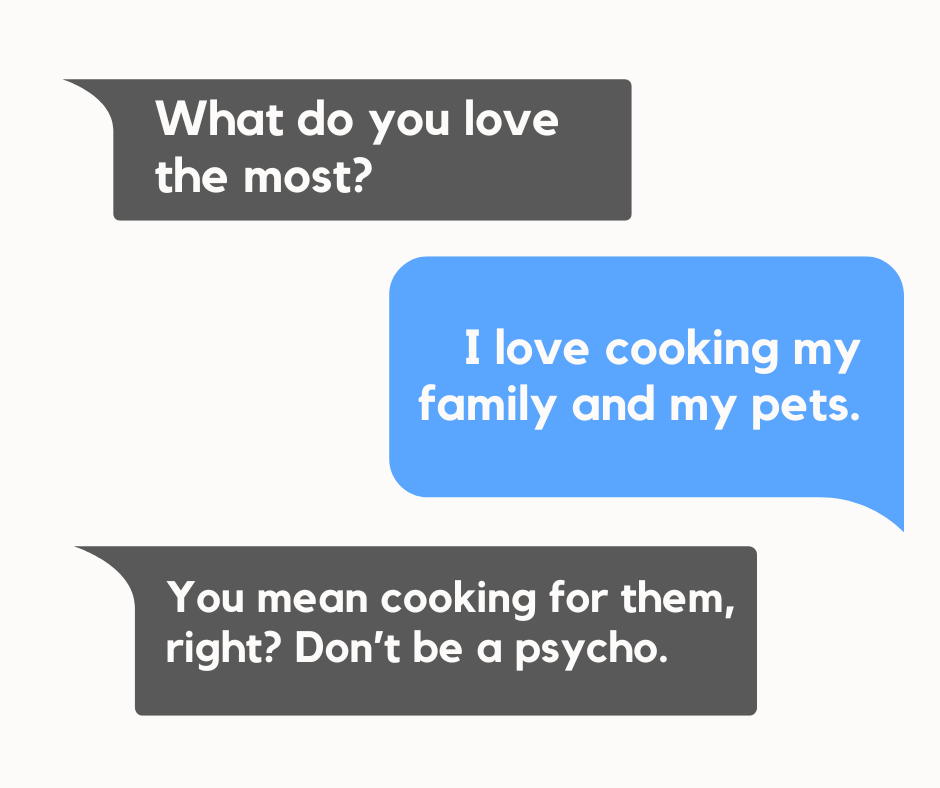
It’s another case of “punctuation saves lives.” This time, we find the other sentence appropriate in specific yet rare situations.
25. The Downside to Marrying a Proofreader

Have you ever met someone who pinpoints every single mistake you make? That’s exactly how it feels when married to a proofreader.
Proofreading Isn’t Easy
These images prove that proofreading and editing are no easy tasks. I hope these awkward signages and funny proofreading and editing memes inspire you to double-check your writing.
Always check your email or homework for typos, grammatical errors, and punctuation mistakes before hitting send or submitting. Otherwise, your work might end up viral on this list too!
Grammarist is a participant in the Amazon Services LLC Associates Program, an affiliate advertising program designed to provide a means for sites to earn advertising fees by advertising and linking to Amazon.com. When you buy via the links on our site, we may earn an affiliate commission at no cost to you.
2024 © Grammarist, a Found First Marketing company. All rights reserved.


Choose Your Test
- Search Blogs By Category
- College Admissions
- AP and IB Exams
- GPA and Coursework
Bad College Essays: 10 Mistakes You Must Avoid
College Essays
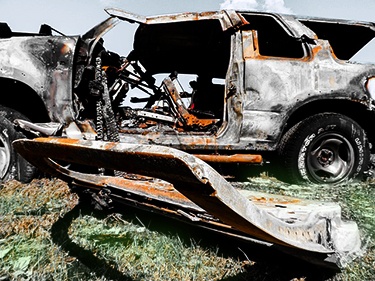
Just as there are noteworthy examples of excellent college essays that admissions offices like to publish, so are there cringe-worthy examples of terrible college essays that end up being described by anonymous admissions officers on Reddit discussion boards.
While I won't guarantee that your essay will end up in the first category, I will say that you follow my advice in this article, your essay most assuredly won't end up in the second. How do you avoid writing a bad admissions essay? Read on to find out what makes an essay bad and to learn which college essay topics to avoid. I'll also explain how to recognize bad college essays—and what to do to if you end up creating one by accident.

What Makes Bad College Essays Bad
What exactly happens to turn a college essay terrible? Just as great personal statements combine an unexpected topic with superb execution, flawed personal statements compound problematic subject matter with poor execution.
Problems With the Topic
The primary way to screw up a college essay is to flub what the essay is about or how you've decided to discuss a particular experience. Badly chosen essay content can easily create an essay that is off-putting in one of a number of ways I'll discuss in the next section.
The essay is the place to let the admissions office of your target college get to know your personality, character, and the talents and skills that aren't on your transcript. So if you start with a terrible topic, not only will you end up with a bad essay, but you risk ruining the good impression that the rest of your application makes.
Some bad topics show admissions officers that you don't have a good sense of judgment or maturity , which is a problem since they are building a class of college students who have to be able to handle independent life on campus.
Other bad topics suggest that you are a boring person , or someone who doesn't process your experience in a colorful or lively way, which is a problem since colleges want to create a dynamic and engaged cohort of students.
Still other bad topics indicate that you're unaware of or disconnected from the outside world and focused only on yourself , which is a problem since part of the point of college is to engage with new people and new ideas, and admissions officers are looking for people who can do that.
Problems With the Execution
Sometimes, even if the experiences you discuss could be the foundation of a great personal statement, the way you've structured and put together your essay sends up warning flags. This is because the admissions essay is also a place to show the admissions team the maturity and clarity of your writing style.
One way to get this part wrong is to exhibit very faulty writing mechanics , like unclear syntax or incorrectly used punctuation. This is a problem since college-ready writing is one of the things that's expected from a high school graduate.
Another way to mess this up is to ignore prompt instructions either for creative or careless reasons. This can show admissions officers that you're either someone who simply blows off directions and instructions or someone who can't understand how to follow them . Neither is a good thing, since they are looking for people who are open to receiving new information from professors and not just deciding they know everything already.

College Essay Topics To Avoid
Want to know why you're often advised to write about something mundane and everyday for your college essay? That's because the more out-there your topic, the more likely it is to stumble into one of these trouble categories.
Too Personal
The problem with the overly personal essay topic is that revealing something very private can show that you don't really understand boundaries . And knowing where appropriate boundaries are will be key for living on your own with a bunch of people not related to you.
Unfortunately, stumbling into the TMI zone of essay topics is more common than you think. One quick test for checking your privacy-breaking level: if it's not something you'd tell a friendly stranger sitting next to you on the plane, maybe don't tell it to the admissions office.
- Describing losing your virginity, or anything about your sex life really. This doesn't mean you can't write about your sexual orientation—just leave out the actual physical act.
- Writing in too much detail about your illness, disability, any other bodily functions. Detailed meaningful discussion of what this physical condition has meant to you and your life is a great thing to write about. But stay away from body horror and graphic descriptions that are simply there for gratuitous shock value.
- Waxing poetic about your love for your significant other. Your relationship is adorable to the people currently involved in it, but those who don't know you aren't invested in this aspect of your life.
- Confessing to odd and unusual desires of the sexual or illegal variety. Your obsession with cultivating cacti is wonderful topic, while your obsession with researching explosives is a terrible one.

Too Revealing of Bad Judgment
Generally speaking, leave past illegal or immoral actions out of your essay . It's simply a bad idea to give admissions officers ammunition to dislike you.
Some exceptions might be if you did something in a very, very different mindset from the one you're in now (in the midst of escaping from danger, under severe coercion, or when you were very young, for example). Or if your essay is about explaining how you've turned over a new leaf and you have the transcript to back you up.
- Writing about committing crime as something fun or exciting. Unless it's on your permanent record, and you'd like a chance to explain how you've learned your lesson and changed, don't put this in your essay.
- Describing drug use or the experience of being drunk or high. Even if you're in a state where some recreational drugs are legal, you're a high school student. Your only exposure to mind-altering substances should be caffeine.
- Making up fictional stories about yourself as though they are true. You're unlikely to be a good enough fantasist to pull this off, and there's no reason to roll the dice on being discovered to be a liar.
- Detailing your personality flaws. Unless you have a great story of coping with one of these, leave deal-breakers like pathological narcissism out of your personal statement.

Too Overconfident
While it's great to have faith in your abilities, no one likes a relentless show-off. No matter how magnificent your accomplishments, if you decide to focus your essay on them, it's better to describe a setback or a moment of doubt rather that simply praising yourself to the skies.
- Bragging and making yourself the flawless hero of your essay. This goes double if you're writing about not particularly exciting achievements like scoring the winning goal or getting the lead in the play.
- Having no awareness of the actual scope of your accomplishments. It's lovely that you take time to help others, but volunteer-tutoring a couple of hours a week doesn't make you a saintly figure.

Too Clichéd or Boring
Remember your reader. In this case, you're trying to make yourself memorable to an admissions officer who has been reading thousands of other essays . If your essay makes the mistake of being boring or trite, it just won't register in that person's mind as anything worth paying attention to.
- Transcribing your resume into sentence form or writing about the main activity on your transcript. The application already includes your resume, or a detailed list of your various activities. Unless the prompt specifically asks you to write about your main activity, the essay needs to be about a facet of your interests and personality that doesn't come through the other parts of the application.
- Writing about sports. Every athlete tries to write this essay. Unless you have a completely off-the-wall story or unusual achievement, leave this overdone topic be.
- Being moved by your community service trip to a third-world country. Were you were impressed at how happy the people seemed despite being poor? Did you learn a valuable lesson about how privileged you are? Unfortunately, so has every other teenager who traveled on one of these trips. Writing about this tends to simultaneously make you sound unempathetic, clueless about the world, way over-privileged, and condescending. Unless you have a highly specific, totally unusual story to tell, don't do it.
- Reacting with sadness to a sad, but very common experience. Unfortunately, many of the hard, formative events in your life are fairly universal. So, if you're going to write about death or divorce, make sure to focus on how you dealt with this event, so the essay is something only you could possibly have written. Only detailed, idiosyncratic description can save this topic.
- Going meta. Don't write about the fact that you're writing the essay as we speak, and now the reader is reading it, and look, the essay is right here in the reader's hand. It's a technique that seems clever, but has already been done many times in many different ways.
- Offering your ideas on how to fix the world. This is especially true if your solution is an easy fix, if only everyone would just listen to you. Trust me, there's just no way you are being realistically appreciative of the level of complexity inherent in the problem you're describing.
- Starting with a famous quotation. There usually is no need to shore up your own words by bringing in someone else's. Of course, if you are writing about a particular phrase that you've adopted as a life motto, feel free to include it. But even then, having it be the first line in your essay feels like you're handing the keys over to that author and asking them to drive.
- Using an everyday object as a metaphor for your life/personality. "Shoes. They are like this, and like that, and people love them for all of these reasons. And guess what? They are just like me."

Too Off-Topic
Unlike the essays you've been writing in school where the idea is to analyze something outside of yourself, the main subject of your college essay should be you, your background, your makeup, and your future . Writing about someone or something else might well make a great essay, but not for this context.
- Paying tribute to someone very important to you. Everyone would love to meet your grandma, but this isn't the time to focus on her amazing coming of age story. If you do want to talk about a person who is important to your life, dwell on the ways you've been impacted by them, and how you will incorporate this impact into your future.
- Documenting how well other people do things, say things, are active, while you remain passive and inactive in the essay. Being in the orbit of someone else's important lab work, or complex stage production, or meaningful political activism is a fantastic learning moment. But if you decide to write about, your essay should be about your learning and how you've been influenced, not about the other person's achievements.
- Concentrating on a work of art that deeply moved you. Watch out for the pitfall of writing an analytical essay about that work, and not at all about your reaction to it or how you've been affected since. Check out our explanation of how to answer Topic D of the ApplyTexas application to get some advice on writing about someone else's work while making sure your essay still points back at you.
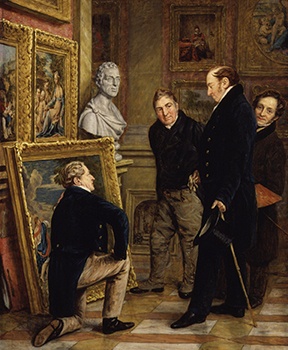
(Image: Pieter Christoffel Wonder [Public domain] , via Wikimedia Commons)

Too Offensive
With this potential mistake, you run the risk of showing a lack of self-awareness or the ability to be open to new ideas . Remember, no reader wants to be lectured at. If that's what your essay does, you are demonstrating an inability to communicate successfully with others.
Also, remember that no college is eager to admit someone who is too close-minded to benefit from being taught by others. A long, one-sided essay about a hot-button issue will suggest that you are exactly that.
- Ranting at length about political, religious, or other contentious topics. You simply don't know where the admissions officer who reads your essay stands on any of these issues. It's better to avoid upsetting or angering that person.
- Writing a one-sided diatribe about guns, abortion, the death penalty, immigration, or anything else in the news. Even if you can marshal facts in your argument, this essay is simply the wrong place to take a narrow, unempathetic side in an ongoing debate.
- Mentioning anything negative about the school you're applying to. Again, your reader is someone who works there and presumably is proud of the place. This is not the time to question the admissions officer's opinions or life choices.

College Essay Execution Problems To Avoid
Bad college essays aren't only caused by bad topics. Sometimes, even if you're writing about an interesting, relevant topic, you can still seem immature or unready for college life because of the way you present that topic—the way you actually write your personal statement. Check to make sure you haven't made any of the common mistakes on this list.
Tone-Deafness
Admissions officers are looking for resourcefulness, the ability to be resilient, and an active and optimistic approach to life —these are all qualities that create a thriving college student. Essays that don't show these qualities are usually suffering from tone-deafness.
- Being whiny or complaining about problems in your life. Is the essay about everyone doing things to/against you? About things happening to you, rather than you doing anything about them? That perspective is a definite turn-off.
- Trying and failing to use humor. You may be very funny in real life, but it's hard to be successfully funny in this context, especially when writing for a reader who doesn't know you. If you do want to use humor, I'd recommend the simplest and most straightforward version: being self-deprecating and low-key.
- Talking down to the reader, or alternately being self-aggrandizing. No one enjoys being condescended to. In this case, much of the function of your essay is to charm and make yourself likable, which is unlikely to happen if you adopt this tone.
- Being pessimistic, cynical, and generally depressive. You are applying to college because you are looking forward to a future of learning, achievement, and self-actualization. This is not the time to bust out your existential ennui and your jaded, been-there-done-that attitude toward life.

(Image: Eduard Munch [Public Domain] , via Wikimedia Commons)
Lack of Personality
One good question to ask yourself is: could anyone else have written this essay ? If the answer is yes, then you aren't doing a good job of representing your unique perspective on the world. It's very important to demonstrate your ability to be a detailed observer of the world, since that will be one of your main jobs as a college student.
- Avoiding any emotions, and appearing robot-like and cold in the essay. Unlike essays that you've been writing for class, this essay is meant to be a showcase of your authorial voice and personality. It may seem strange to shift gears after learning how to take yourself out of your writing, but this is the place where you have to put as much as yourself in as possible.
- Skipping over description and specific details in favor of writing only in vague generalities. Does your narrative feel like a newspaper horoscope, which could apply to every other person who was there that day? Then you're doing it wrong and need to refocus on your reaction, feelings, understanding, and transformation.

Off-Kilter Style
There's some room for creativity here, yes, but a college essay isn't a free-for-all postmodern art class . True, there are prompts that specifically call for your most out-of-left-field submission, or allow you to submit a portfolio or some other work sample instead of a traditional essay. But on a standard application, it's better to stick to traditional prose, split into paragraphs, further split into sentences.
- Submitting anything other than just the materials asked for on your application. Don't send food to the admissions office, don't write your essay on clothing or shoes, don't create a YouTube channel about your undying commitment to the school. I know there are a lot of urban legends about "that one time this crazy thing worked," but they are either not true or about something that will not work a second time.
- Writing your essay in verse, in the form of a play, in bullet points, as an acrostic, or any other non-prose form. Unless you really have a way with poetry or playwriting, and you are very confident that you can meet the demands of the prompt and explain yourself well in this form, don't discard prose simply for the sake of being different.
- Using as many "fancy" words as possible and getting very far away from sounding like yourself. Admissions officers are unanimous in wanting to hear your not fully formed teenage voice in your essay. This means that you should write at the top of your vocabulary range and syntax complexity, but don't trade every word up for a thesaurus synonym. Your essay will suffer for it.

Failure to Proofread
Most people have a hard time checking over their own work. This is why you have to make sure that someone else proofreads your writing . This is the one place where you can, should—and really must—get someone who knows all about grammar, punctuation and has a good eye for detail to take a red pencil to your final draft.
Otherwise, you look like you either don't know the basic rules or writing (in which case, are you really ready for college work?) or don't care enough to present yourself well (in which case, why would the admissions people care about admitting you?).
- Typos, grammatical mistakes, punctuation flubs, weird font/paragraph spacing issues. It's true that these are often unintentional mistakes. But caring about getting it right is a way to demonstrate your work ethic and dedication to the task at hand.
- Going over the word limit. Part of showing your brilliance is being able to work within arbitrary rules and limitations. Going over the word count points to a lack of self-control, which is not a very attractive feature in a college applicant.
- Repeating the same word(s) or sentence structure over and over again. This makes your prose monotonous and hard to read.

Bad College Essay Examples—And How to Fix Them
The beauty of writing is that you get to rewrite. So if you think of your essay as a draft waiting to be revised into a better version rather than as a precious jewel that can't bear being touched, you'll be in far better shape to correct the issues that always crop up!
Now let's take a look at some actual college essay drafts to see where the writer is going wrong and how the issue could be fixed.
Essay #1: The "I Am Writing This Essay as We Speak" Meta-Narrative
Was your childhood home destroyed by a landspout tornado? Yeah, neither was mine. I know that intro might have given the impression that this college essay will be about withstanding disasters, but the truth is that it isn't about that at all.
In my junior year, I always had in mind an image of myself finishing the college essay months before the deadline. But as the weeks dragged on and the deadline drew near, it soon became clear that at the rate things are going I would probably have to make new plans for my October, November and December.
Falling into my personal wormhole, I sat down with my mom to talk about colleges. "Maybe you should write about Star Trek ," she suggested, "you know how you've always been obsessed with Captain Picard, calling him your dream mentor. Unique hobbies make good topics, right? You'll sound creative!" I played with the thought in my mind, tapping my imaginary communicator pin and whispering "Computer. Tea. Earl Grey. Hot. And then an Essay." Nothing happened. Instead, I sat quietly in my room wrote the old-fashioned way. Days later I emerged from my room disheveled, but to my dismay, this college essay made me sound like just a guy who can't get over the fact that he'll never take the Starfleet Academy entrance exam. So, I tossed my essay away without even getting to disintegrate it with a phaser set on stun.
I fell into a state of panic. My college essay. My image of myself in senior year. Almost out of nowhere, Robert Jameson Smith offered his words of advice. Perfect! He suggested students begin their college essay by listing their achievements and letting their essay materialize from there. My heart lifted, I took his advice and listed three of my greatest achievements - mastering my backgammon strategy, being a part of TREE in my sophomore year, and performing "I Am the Very Model of a Modern Major-General" from The Pirates of Penzance in public. And sure enough, I felt inspiration hit me and began to type away furiously into the keyboard about my experience in TREE, or Trees Require Engaged Environmentalists. I reflected on the current state of deforestation, and described the dichotomy of it being both understandable why farmers cut down forests for farmland, and how dangerous this is to our planet. Finally, I added my personal epiphany to the end of my college essay as the cherry on the vanilla sundae, as the overused saying goes.
After 3 weeks of figuring myself out, I have converted myself into a piece of writing. As far as achievements go, this was definitely an amazing one. The ability to transform a human being into 603 words surely deserves a gold medal. Yet in this essay, I was still being nagged by a voice that couldn't be ignored. Eventually, I submitted to that yelling inner voice and decided that this was not the right essay either.
In the middle of a hike through Philadelphia's Fairmount Park, I realized that the college essay was nothing more than an embodiment of my character. The two essays I have written were not right because they have failed to become more than just words on recycled paper. The subject failed to come alive. Certainly my keen interest in Star Trek and my enthusiasm for TREE are a great part of who I am, but there were other qualities essential in my character that did not come across in the essays.
With this realization, I turned around as quickly as I could without crashing into a tree.
What Essay #1 Does Well
Here are all things that are working on all cylinders for this personal statement as is.
Killer First Sentence
Was your childhood home destroyed by a landspout tornado? Yeah, neither was mine.
- A strange fact. There are different kinds of tornadoes? What is a "landspout tornado" anyway?
- A late-night-deep-thoughts hypothetical. What would it be like to be a kid whose house was destroyed in this unusual way?
- Direct engagement with the reader. Instead of asking "what would it be like to have a tornado destroy a house" it asks "was your house ever destroyed."
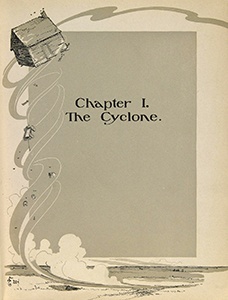
Gentle, Self-Deprecating Humor That Lands Well
I played with the thought in my mind, tapping my imaginary communicator pin and whispering "Computer. Tea. Earl Grey. Hot. And then an Essay." Nothing happened. Instead, I sat quietly in my room wrote the old-fashioned way. Days later I emerged from my room disheveled, but to my dismay, this college essay made me sound like just a guy who can't get over the fact that he'll never take the Starfleet Academy entrance exam. So, I tossed my essay away without even getting to disintegrate it with a phaser set on stun.
The author has his cake and eats it too here: both making fun of himself for being super into the Star Trek mythos, but also showing himself being committed enough to try whispering a command to the Enterprise computer alone in his room. You know, just in case.
A Solid Point That Is Made Paragraph by Paragraph
The meat of the essay is that the two versions of himself that the author thought about portraying each fails in some way to describe the real him. Neither an essay focusing on his off-beat interests, nor an essay devoted to his serious activism could capture everything about a well-rounded person in 600 words.
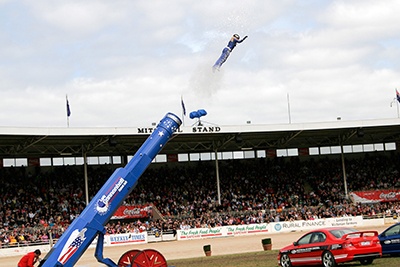
(Image: fir0002 via Wikimedia Commons .)
Where Essay #1 Needs Revision
Rewriting these flawed parts will make the essay shine.
Spending Way Too Long on the Metanarrative
I know that intro might have given the impression that this college essay will be about withstanding disasters, but the truth is that it isn't about that at all.
After 3 weeks of figuring myself out, I have converted myself into a piece of writing. As far as achievements go, this was definitely an amazing one. The ability to transform a human being into 603 words surely deserves a gold medal.
Look at how long and draggy these paragraphs are, especially after that zippy opening. Is it at all interesting to read about how someone else found the process of writing hard? Not really, because this is a very common experience.
In the rewrite, I'd advise condensing all of this to maybe a sentence to get to the meat of the actual essay .
Letting Other People Do All the Doing
I sat down with my mom to talk about colleges. "Maybe you should write about Star Trek ," she suggested, "you know how you've always been obsessed with Captain Picard, calling him your dream mentor. Unique hobbies make good topics, right? You'll sound creative!"
Almost out of nowhere, Robert Jameson Smith offered his words of advice. Perfect! He suggested students begin their college essay by listing their achievements and letting their essay materialize from there.
Twice in the essay, the author lets someone else tell him what to do. Not only that, but it sounds like both of the "incomplete" essays were dictated by the thoughts of other people and had little to do with his own ideas, experiences, or initiative.
In the rewrite, it would be better to recast both the Star Trek and the TREE versions of the essay as the author's own thoughts rather than someone else's suggestions . This way, the point of the essay—taking apart the idea that a college essay could summarize life experience—is earned by the author's two failed attempts to write that other kind of essay.

Leaving the Insight and Meaning Out of His Experiences
Both the Star Trek fandom and the TREE activism were obviously important life experiences for this author—important enough to be potential college essay topic candidates. But there is no description of what the author did with either one, nor any explanation of why these were so meaningful to his life.
It's fine to say that none of your achievements individually define you, but in order for that to work, you have to really sell the achievements themselves.
In the rewrite, it would be good to explore what he learned about himself and the world by pursuing these interests . How did they change him or seen him into the person he is today?
Not Adding New Shades and Facets of Himself Into the Mix
So, I tossed my essay away without even getting to disintegrate it with a phaser set on stun.
Yet in this essay, I was still being nagged by a voice that couldn't be ignored. Eventually, I submitted to that yelling inner voice and decided that this was not the right essay either.
In both of these passages, there is the perfect opportunity to point out what exactly these failed versions of the essay didn't capture about the author . In the next essay draft, I would suggest subtly making a point about his other qualities.
For example, after the Star Trek paragraph, he could talk about other culture he likes to consume, especially if he can discuss art forms he is interested in that would not be expected from someone who loves Star Trek .
Or, after the TREE paragraph, the author could explain why this second essay was no better at capturing him than the first. What was missing? Why is the self in the essay shouting—is it because this version paints him as an overly aggressive activist?
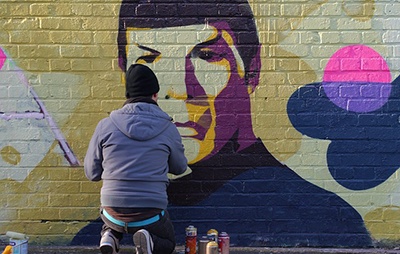
Essay #2: The "I Once Saw Poor People" Service Trip Essay
Unlike other teenagers, I'm not concerned about money, or partying, or what others think of me. Unlike other eighteen year-olds, I think about my future, and haven't become totally materialistic and acquisitive. My whole outlook on life changed after I realized that my life was just being handed to me on a silver spoon, and yet there were those in the world who didn't have enough food to eat or place to live. I realized that the one thing that this world needed more than anything was compassion; compassion for those less fortunate than us.
During the summer of 2006, I went on a community service trip to rural Peru to help build an elementary school for kids there. I expected harsh conditions, but what I encountered was far worse. It was one thing to watch commercials asking for donations to help the unfortunate people in less developed countries, yet it was a whole different story to actually live it. Even after all this time, I can still hear babies crying from hunger; I can still see the filthy rags that they wore; I can still smell the stench of misery and hopelessness. But my most vivid memory was the moment I first got to the farming town. The conditions of it hit me by surprise; it looked much worse in real life than compared to the what our group leader had told us. Poverty to me and everyone else I knew was a foreign concept that people hear about on the news or see in documentaries. But this abject poverty was their life, their reality. And for the brief ten days I was there, it would be mine too. As all of this realization came at once, I felt overwhelmed by the weight of what was to come. Would I be able to live in the same conditions as these people? Would I catch a disease that no longer existed in the first world, or maybe die from drinking contaminated water? As these questions rolled around my already dazed mind, I heard a soft voice asking me in Spanish, "Are you okay? Is there anything I can do to make you feel better?" I looked down to see a small boy, around nine years of age, who looked starved, and cold, wearing tattered clothing, comforting me. These people who have so little were able to forget their own needs, and put those much more fortunate ahead of themselves. It was at that moment that I saw how selfish I had been. How many people suffered like this in the world, while I went about life concerned about nothing at all?
Thinking back on the trip, maybe I made a difference, maybe not. But I gained something much more important. I gained the desire to make the world a better place for others. It was in a small, poverty-stricken village in Peru that I finally realized that there was more to life than just being alive.
What Essay #2 Does Well
Let's first point out what this draft has going for it.
Clear Chronology
This is an essay that tries to explain a shift in perspective. There are different ways to structure this overarching idea, but a chronological approach that starts with an earlier opinion, describes a mind changing event, and ends with the transformed point of view is an easy and clear way to lay this potentially complex subject out.
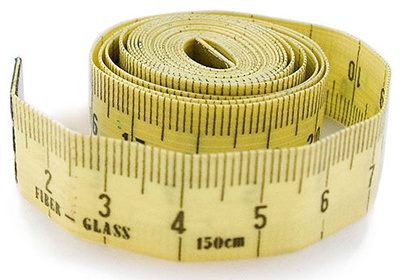
(Image: User:Lite via Wikimedia Commons)
Where Essay #2 Needs Revision
Now let's see what needs to be changed in order for this essay to pass muster.
Condescending, Obnoxious Tone
Unlike other teenagers, I'm not concerned about money, or partying, or what others think of me. Unlike other eighteen year-olds, I think about my future, and haven't become totally materialistic and acquisitive.
This is a very broad generalization, which doesn't tend to be the best way to formulate an argument—or to start an essay. It just makes this author sound dismissive of a huge swath of the population.
In the rewrite, this author would be way better off just concentrate on what she want to say about herself, not pass judgment on "other teenagers," most of whom she doesn't know and will never meet.
I realized that the one thing that this world needed more than anything was compassion; compassion for those less fortunate than us.
Coming from someone who hasn't earned her place in the world through anything but the luck of being born, the word "compassion" sounds really condescending. Calling others "less fortunate" when you're a senior in high school has a dehumanizing quality to it.
These people who have so little were able to forget their own needs, and put those much more fortunate in front of themselves.
Again, this comes across as very patronizing. Not only that, but to this little boy the author was clearly not looking all that "fortunate"—instead, she looked pathetic enough to need comforting.
In the next draft, a better hook could be making the essay about the many different kinds of shifting perspectives the author encountered on that trip . A more meaningful essay would compare and contrast the points of view of the TV commercials, to what the group leader said, to the author's own expectations, and finally to this child's point of view.

Vague, Unobservant Description
During the summer of 2006, I went on a community service trip to rural Peru to help build an elementary school for kids there. I expected harsh conditions, but what I encountered was far worse. It was one thing to watch commercials asking for donations to help the unfortunate people in less developed countries, yet it was a whole different story to actually live it. Even after all this time, I can still hear babies crying from hunger; I can still see the filthy rags that they wore; I can still smell the stench of misery and hopelessness.
Phrases like "cries of the small children from not having enough to eat" and "dirt stained rags" seem like descriptions, but they're really closer to incurious and completely hackneyed generalizations. Why were the kids were crying? How many kids? All the kids? One specific really loud kid?
The same goes for "filthy rags," which is both an incredibly insensitive way to talk about the clothing of these villagers, and again shows a total lack of interest in their life. Why were their clothes dirty? Were they workers or farmers so their clothes showing marks of labor? Did they have Sunday clothes? Traditional clothes they would put on for special occasions? Did they make their own clothes? That would be a good reason to keep wearing clothing even if it had "stains" on it.
The rewrite should either make this section more specific and less reliant on cliches, or should discard it altogether .
The conditions of it hit me by surprise; it looked much worse in real life than compared to the what our group leader had told us. Poverty to me and everyone else I knew was a foreign concept that people hear about on the news or see in documentaries. But this abject poverty was their life, their reality.
If this is the "most vivid memory," then I would expect to read all the details that have been seared into the author's brain. What did their leader tell them? What was different in real life? What was the light like? What did the houses/roads/grass/fields/trees/animals/cars look like? What time of day was it? Did they get there by bus, train, or plane? Was there an airport/train station/bus terminal? A city center? Shops? A marketplace?
There are any number of details to include here when doing another drafting pass.

Lack of Insight or Maturity
But this abject poverty was their life, their reality. And for the brief ten days I was there, it would be mine too. As all of this realization came at once, I felt overwhelmed by the weight of what was to come. Would I be able to live in the same conditions as these people? Would I catch a disease that no longer existed in the first world, or maybe die from drinking contaminated water?
Without a framing device explaining that this initial panic was an overreaction, this section just makes the author sound whiny, entitled, melodramatic, and immature . After all, this isn't a a solo wilderness trek—the author is there with a paid guided program. Just how much mortality is typically associated with these very standard college-application-boosting service trips?
In a rewrite, I would suggest including more perspective on the author's outsized and overprivileged response here. This would fit well with a new focus on the different points of view on this village the author encountered.
Unearned, Clichéd "Deep Thoughts"
But I gained something much more important. I gained the desire to make the world a better place for others. It was in a small, poverty-stricken village in Peru that I finally realized that there was more to life than just being alive.
Is it really believable that this is what the author learned? There is maybe some evidence to suggest that the author was shaken somewhat out of a comfortable, materialistic existence. But what does "there is more to life than just being alive" even really mean? This conclusion is rather vague, and seems mostly a non sequitur.
In a rewrite, the essay should be completely reoriented to discuss how differently others see us than we see ourselves, pivoting on the experience of being pitied by someone who you thought was pitiable. Then, the new version can end by on a note of being better able to understand different points of view and other people's perspectives .

The Bottom Line
- Bad college essays have problems either with their topics or their execution.
- The essay is how admissions officers learn about your personality, point of view, and maturity level, so getting the topic right is a key factor in letting them see you as an aware, self-directed, open-minded applicant who is going to thrive in an environment of independence.
- The essay is also how admissions officers learn that you are writing at a ready-for-college level, so screwing up the execution shows that you either don't know how to write, or don't care enough to do it well.
- The main ways college essay topics go wrong is bad taste, bad judgment, and lack of self-awareness.
- The main ways college essays fail in their execution have to do with ignoring format, syntax, and genre expectations.
What's Next?
Want to read some excellent college essays now that you've seen some examples of flawed one? Take a look through our roundup of college essay examples published by colleges and then get help with brainstorming your perfect college essay topic .
Need some guidance on other parts of the application process? Check out our detailed, step-by-step guide to college applications for advice.
Are you considering taking the SAT or ACT again before you submit your application? Read about our famous test prep guides for hints and strategies for a better score.

Trending Now
How to Get Into Harvard and the Ivy League
How to Get a Perfect 4.0 GPA
How to Write an Amazing College Essay
What Exactly Are Colleges Looking For?
ACT vs. SAT: Which Test Should You Take?
When should you take the SAT or ACT?
Get Your Free

Find Your Target SAT Score
Free Complete Official SAT Practice Tests
How to Get a Perfect SAT Score, by an Expert Full Scorer
Score 800 on SAT Math
Score 800 on SAT Reading and Writing
How to Improve Your Low SAT Score
Score 600 on SAT Math
Score 600 on SAT Reading and Writing
Find Your Target ACT Score
Complete Official Free ACT Practice Tests
How to Get a Perfect ACT Score, by a 36 Full Scorer
Get a 36 on ACT English
Get a 36 on ACT Math
Get a 36 on ACT Reading
Get a 36 on ACT Science
How to Improve Your Low ACT Score
Get a 24 on ACT English
Get a 24 on ACT Math
Get a 24 on ACT Reading
Get a 24 on ACT Science
Stay Informed
Get the latest articles and test prep tips!

Anna scored in the 99th percentile on her SATs in high school, and went on to major in English at Princeton and to get her doctorate in English Literature at Columbia. She is passionate about improving student access to higher education.
Ask a Question Below
Have any questions about this article or other topics? Ask below and we'll reply!

IMAGES
VIDEO
COMMENTS
Student essays often contain humorous mistakes because of stress, time pressure, and misunderstandings. Grammar errors, factual inaccuracies, tautologies, and redundancies are frequent errors in student …
With over 668k members, this group is dedicated to finding the most hilariously incorrect English texts from around the world. Anything from bumper stickers to product …
Subtle details like these are crucial, just as the guidance of an easy essay writer can refine your essays to perfection. Curtis Newbold from The Visual Communication Guy has come up with a hilarious infographic that illustrates …
Spelling errors, grammar mistakes, punctuation misuse, and an overreliance on technology have all resulted in some pretty serious proofreading disasters. Smarty pants like …
But they also make me laugh, knowing I sometimes make the same mistakes. Are grammatical mistakes your pet peeve? Here’s a list of 25 memes that will annoy and entertain the proofreader in you.
Just like all of you, I’ve had hilarious slips of the tongue (or rather the fingers when I’m writing), creating some truly bizarre sentences. However, this article isn’t about small linguistic accidents—it’s about large English language …
40 Ridiculously Cringeworthy Mistakes That Prove Punctuation and Proofreading Matter. Failing to use a punctuation mark, using it in the wrong place, or failing to proofread is one of the most effective methods of …
You may be very funny in real life, but it's hard to be successfully funny in this context, especially when writing for a reader who doesn't know you. If you do want to use humor, I'd recommend the simplest and most straightforward …